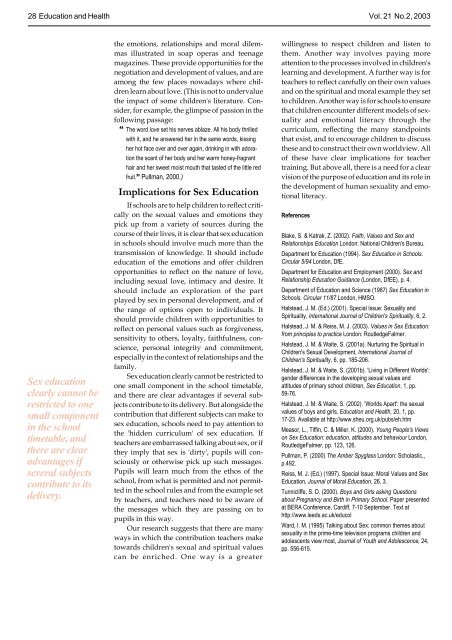'Love and Trust': Making Space for Feelings in Sex Education - SHEU
'Love and Trust': Making Space for Feelings in Sex Education - SHEU
'Love and Trust': Making Space for Feelings in Sex Education - SHEU
Create successful ePaper yourself
Turn your PDF publications into a flip-book with our unique Google optimized e-Paper software.
28 <strong>Education</strong> <strong>and</strong> Health Vol. 21 No.2, 2003<br />
<strong>Sex</strong> education<br />
clearly cannot be<br />
restricted to one<br />
small component<br />
<strong>in</strong> the school<br />
timetable, <strong>and</strong><br />
there are clear<br />
advantages if<br />
several subjects<br />
contribute to its<br />
delivery.<br />
the emotions, relationships <strong>and</strong> moral dilemmas<br />
illustrated <strong>in</strong> soap operas <strong>and</strong> teenage<br />
magaz<strong>in</strong>es. These provide opportunities <strong>for</strong> the<br />
negotiation <strong>and</strong> development of values, <strong>and</strong> are<br />
among the few places nowadays where children<br />
learn about love. (This is not to undervalue<br />
the impact of some children's literature. Consider,<br />
<strong>for</strong> example, the glimpse of passion <strong>in</strong> the<br />
follow<strong>in</strong>g passage:<br />
� The word love set his nerves ablaze. All his body thrilled<br />
with it, <strong>and</strong> he answered her <strong>in</strong> the same words, kiss<strong>in</strong>g<br />
her hot face over <strong>and</strong> over aga<strong>in</strong>, dr<strong>in</strong>k<strong>in</strong>g <strong>in</strong> with adoration<br />
the scent of her body <strong>and</strong> her warm honey-fragrant<br />
hair <strong>and</strong> her sweet moist mouth that tasted of the little red<br />
fruit.� Pullman, 2000.)<br />
Implications <strong>for</strong> <strong>Sex</strong> <strong>Education</strong><br />
If schools are to help children to reflect critically<br />
on the sexual values <strong>and</strong> emotions they<br />
pick up from a variety of sources dur<strong>in</strong>g the<br />
course of their lives, it is clear that sex education<br />
<strong>in</strong> schools should <strong>in</strong>volve much more than the<br />
transmission of knowledge. It should <strong>in</strong>clude<br />
education of the emotions <strong>and</strong> offer children<br />
opportunities to reflect on the nature of love,<br />
<strong>in</strong>clud<strong>in</strong>g sexual love, <strong>in</strong>timacy <strong>and</strong> desire. It<br />
should <strong>in</strong>clude an exploration of the part<br />
played by sex <strong>in</strong> personal development, <strong>and</strong> of<br />
the range of options open to <strong>in</strong>dividuals. It<br />
should provide children with opportunities to<br />
reflect on personal values such as <strong>for</strong>giveness,<br />
sensitivity to others, loyalty, faithfulness, conscience,<br />
personal <strong>in</strong>tegrity <strong>and</strong> commitment,<br />
especially <strong>in</strong> the context of relationships <strong>and</strong> the<br />
family.<br />
<strong>Sex</strong> education clearly cannot be restricted to<br />
one small component <strong>in</strong> the school timetable,<br />
<strong>and</strong> there are clear advantages if several subjects<br />
contribute to its delivery. But alongside the<br />
contribution that different subjects can make to<br />
sex education, schools need to pay attention to<br />
the 'hidden curriculum' of sex education. If<br />
teachers are embarrassed talk<strong>in</strong>g about sex, or if<br />
they imply that sex is 'dirty', pupils will consciously<br />
or otherwise pick up such messages.<br />
Pupils will learn much from the ethos of the<br />
school, from what is permitted <strong>and</strong> not permitted<br />
<strong>in</strong> the school rules <strong>and</strong> from the example set<br />
by teachers, <strong>and</strong> teachers need to be aware of<br />
the messages which they are pass<strong>in</strong>g on to<br />
pupils <strong>in</strong> this way.<br />
Our research suggests that there are many<br />
ways <strong>in</strong> which the contribution teachers make<br />
towards children's sexual <strong>and</strong> spiritual values<br />
can be enriched. One way is a greater<br />
will<strong>in</strong>gness to respect children <strong>and</strong> listen to<br />
them. Another way <strong>in</strong>volves pay<strong>in</strong>g more<br />
attention to the processes <strong>in</strong>volved <strong>in</strong> children's<br />
learn<strong>in</strong>g <strong>and</strong> development. A further way is <strong>for</strong><br />
teachers to reflect carefully on their own values<br />
<strong>and</strong> on the spiritual <strong>and</strong> moral example they set<br />
to children. Another way is <strong>for</strong> schools to ensure<br />
that children encounter different models of sexuality<br />
<strong>and</strong> emotional literacy through the<br />
curriculum, reflect<strong>in</strong>g the many st<strong>and</strong>po<strong>in</strong>ts<br />
that exist, <strong>and</strong> to encourage children to discuss<br />
these <strong>and</strong> to construct their own worldview. All<br />
of these have clear implications <strong>for</strong> teacher<br />
tra<strong>in</strong><strong>in</strong>g. But above all, there is a need <strong>for</strong> a clear<br />
vision of the purpose of education <strong>and</strong> its role <strong>in</strong><br />
the development of human sexuality <strong>and</strong> emotional<br />
literacy.<br />
References<br />
Blake, S. & Katrak, Z. (2002). Faith, Values <strong>and</strong> <strong>Sex</strong> <strong>and</strong><br />
Relationships <strong>Education</strong> London: National Children's Bureau.<br />
Department <strong>for</strong> <strong>Education</strong> (1994). <strong>Sex</strong> <strong>Education</strong> <strong>in</strong> Schools.<br />
Circular 5/94 London, DfE.<br />
Department <strong>for</strong> <strong>Education</strong> <strong>and</strong> Employment (2000). <strong>Sex</strong> <strong>and</strong><br />
Relationship <strong>Education</strong> Guidance (London, DfEE), p. 4.<br />
Department of <strong>Education</strong> <strong>and</strong> Science (1987) <strong>Sex</strong> <strong>Education</strong> <strong>in</strong><br />
Schools. Circular 11/87 London, HMSO.<br />
Halstead, J. M. (Ed.) (2001). Special Issue: <strong>Sex</strong>uality <strong>and</strong><br />
Spirituality, International Journal of Children's Spirituality,6,2.<br />
Halstead, J. M. & Reiss, M. J. (2003). Values <strong>in</strong> <strong>Sex</strong> <strong>Education</strong>:<br />
from pr<strong>in</strong>ciples to practice London: RoutledgeFalmer.<br />
Halstead, J. M. & Waite, S. (2001a). Nurtur<strong>in</strong>g the Spiritual <strong>in</strong><br />
Children's <strong>Sex</strong>ual Development, International Journal of<br />
Children's Spirituality, 6, pp. 185-206.<br />
Halstead, J. M. & Waite, S. (2001b). 'Liv<strong>in</strong>g <strong>in</strong> Different Worlds':<br />
gender differences <strong>in</strong> the develop<strong>in</strong>g sexual values <strong>and</strong><br />
attitudes of primary school children, <strong>Sex</strong> <strong>Education</strong>,1,pp.<br />
59-76.<br />
Halstead, J. M. & Waite, S. (2002). 'Worlds Apart': the sexual<br />
values of boys <strong>and</strong> girls, <strong>Education</strong> <strong>and</strong> Health, 20, 1, pp.<br />
17-23. Available at http://www.sheu.org.uk/pubs/eh.htm<br />
Measor, L., Tiff<strong>in</strong>, C. & Miller, K. (2000). Young People's Views<br />
on <strong>Sex</strong> <strong>Education</strong>: education, attitudes <strong>and</strong> behaviour London,<br />
RoutledgeFalmer, pp. 123, 126.<br />
Pullman, P. (2000) The Amber Spyglass London: Scholastic,,<br />
p.492.<br />
Reiss, M. J. (Ed.) (1997). Special Issue: Moral Values <strong>and</strong> <strong>Sex</strong><br />
<strong>Education</strong>, Journal of Moral <strong>Education</strong>, 26, 3.<br />
Tunnicliffe, S. D. (2000). Boys <strong>and</strong> Girls ask<strong>in</strong>g Questions<br />
about Pregnancy <strong>and</strong> Birth <strong>in</strong> Primary School. Paper presented<br />
at BERA Conference, Cardiff, 7-10 September. Text at<br />
http://www.leeds.ac.uk/educol<br />
Ward, I. M. (1995) Talk<strong>in</strong>g about <strong>Sex</strong>: common themes about<br />
sexuality <strong>in</strong> the prime-time television programs children <strong>and</strong><br />
adolescents view most, Journal of Youth <strong>and</strong> Adolescence, 24,<br />
pp. 556-615.




